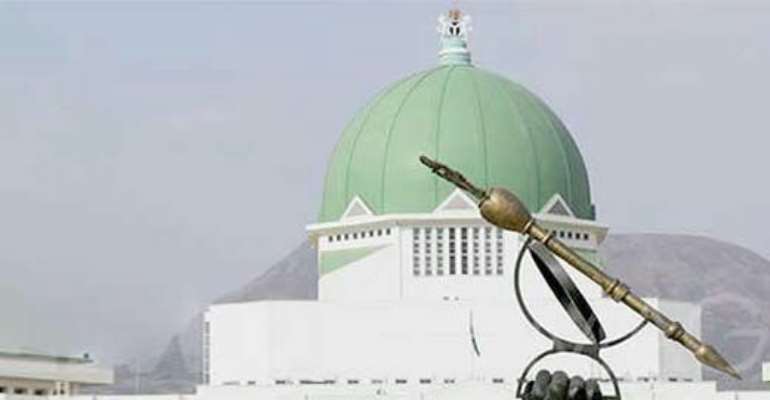On whose side is the National Assembly?

This question reflects a critical opinion held by a majority of Nigerians, especially those who are just electorates and have given out their political will by voting. It is a question that political instruments would like to know who is asking, what party does he or she belong to? Is he or she a leader of a movement we can buy over? Of course, 2019 election is around the corner. It is a question from the collective opinion of the average Nigerian whose main interest is to have a proficient government, a country safe and secured, and the National Assembly is very crucial if these goals would ever be achieved.
Lawmakers, the world over are quite instrumental in achieving a sane country with robust developmental strides, they are those formulating ideas into policies, check and balance the executive arm, at higher level of authority some would turn ideas into statutory corporations, authorities, agencies, others into Acts and laws so long they are in line with executive arm. Nigeria's National Assembly is not an exception with a constitutional backing in Section 47 of the 1999 Constitution as amended. There is no doubt about the capacity of the National Assembly but there is a huge doubt on whose side the 8th National Assembly is.
A senator represents the total number of persons in his senatorial district, same goes with the House of Assembly member projecting the interest of all the people from his constituency, but in many cases the word "suppose" will be added to the statement above. Beyond this, the National Assembly members are also to check the executive, to ensure the human, natural and economic resources of Nigeria are well utilized regardless of political loyalty and aspirations. These are becoming mere paper tigers like other things clogging the wheel of Nigeria’s democracy.
This question was never a construction of political pressure, both the majority party APC and PDP play active roles in the ongoing distrust of what the National Assembly stands for, it is a question birthed from continuous sloppy deviation of the 8th National Assembly, with their medicine after death approaches, most of their deliberations end up majoring in minor and minoring in the major.
Anyone who comes into equity must come with clean hands, the National Assembly with so many loads of controversies, scandals, ideologies they surmounted, challenged and some they rolled under the carpet, have not come this far untainted. Claiming neutrality with this accumulated issues would account for swimming in a pool without getting wet.
The debate on immunity for National Assembly members starting from the principal officers dominated public space at a time when the Senate President, Senator Bukola Saraki had some things to clarify with Code of Conduct Tribunal (CCT), the controversial request Nigerian Custom boss, Col. Hameed Ali must appear before the house in his official uniform; they summon for the Inspector General of Police Ibrahim Idris on the killings in Benue and other affected States which section 89 subsection 1(c) backs up with emphasis on "any person", the IGP is still expected. The constant rejection of acting Chairman of EFCC, Ibrahim Magu as the best man for the job has made him one of the longest serving acting Chairmen in recent times, the symbol of authority, the Maze was taken and dropped at the city gate in Abuja, the Offa Robbery with claims from suspects inclining the Senate President, the motion for the impeachment of Mr. President if security is no enhanced, the spontaneous redcarpetting and divided party loyalty among many others have in one or the other stained the “objective” garment of the National Assembly.
The passage of the 2018 budget which President Buhari, claimed he was compelled to sign, also raised many eyebrows to the stand of the National Assembly in this gallant pursuit of a better Nigeria. Budgets for constituencies and senatorial districts was increased to N578 billion, with additional 6,403 projects without due consultation with the executives, while 4,700 projects of the executive was reduced to N347 billion, the absence of both the Senate President and the Speaker, House of the Assembly, although they sent representatives, during the budget signing, was also significant and has sent home messages unintended. The National Assembly certainly have reasons for these changes, they want more and better grassroots projects for Nigerians. President Buhari has also promised to present what will be the earliest supplementary budget which is backed by Section 84, subsection 4 of the constitution, to complement these changes.
Despite all these challenges the 8th National Assembly of Nigeria has achieved some quantum's of success, their active role in combating illegal migration in Nigeria, with several public hearing in affected areas, ongoing support of the anti-grazing law in affected, their role in the actualization of the not too young to run the bill.
On whose side is the National Assembly standing? Are they standing on the side of the electorates that exchanged their rights by voting, or the executive working assiduously to make things work or are they on their own side for their pockets, party and family? They might just be on the fence playing diplomacy with every national issue, reasoning along benefits, successful plights and many more but the executive arm is no saint, neither is the vulnerable electorates achieving a recall, you know the best answer.
